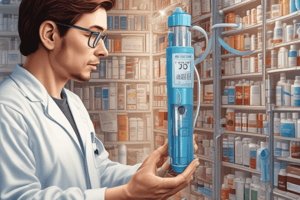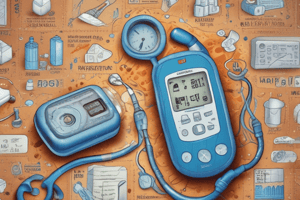Podcast
Questions and Answers
What is the primary goal of collaborative efforts in insulin therapy?
What is the primary goal of collaborative efforts in insulin therapy?
- To improve patient outcomes and insulin dosing (correct)
- To develop a new type of insulin therapy
- To reduce the cost of insulin treatment
- To increase the number of healthcare professionals involved
What is the result of using an integrated care pathway for insulin therapy in a hospital diabetes service?
What is the result of using an integrated care pathway for insulin therapy in a hospital diabetes service?
- 50% of patients changing their regimen and 25% reaching glycemic control
- 33% of patients changing their regimen and 20% reaching glycemic control
- 95% of patients changing their regimen and 50% reaching glycemic control
- 83% of patients changing their regimen and 38% reaching glycemic control (correct)
What is the primary benefit of interprofessional collaboration in healthcare?
What is the primary benefit of interprofessional collaboration in healthcare?
- Enhanced quality of care through coordination of clinical practice (correct)
- Reduced costs of healthcare services
- Increased patient satisfaction with hospital food
- Increased autonomy of healthcare professionals
Who are the primary healthcare professionals involved in an integrated care pathway for insulin therapy?
Who are the primary healthcare professionals involved in an integrated care pathway for insulin therapy?
What is the average time to achieve glycemic control using an integrated care pathway for insulin therapy?
What is the average time to achieve glycemic control using an integrated care pathway for insulin therapy?
What is the benefit of consulting with diabetes educators for insulin-treated patients?
What is the benefit of consulting with diabetes educators for insulin-treated patients?
What contributes to the potential damage in a profession when linked to evidence based on poor glycemic control in diabetes?
What contributes to the potential damage in a profession when linked to evidence based on poor glycemic control in diabetes?
What is a key component of successful interprofessional collaboration in insulin dosing?
What is a key component of successful interprofessional collaboration in insulin dosing?
Why is it beneficial for healthcare providers to learn about other disciplines involved in insulin therapy?
Why is it beneficial for healthcare providers to learn about other disciplines involved in insulin therapy?
What can physicians educate nurses, pharmacists, and dieticians about?
What can physicians educate nurses, pharmacists, and dieticians about?
What can be an outcome of increased interprofessional collaboration in insulin therapy?
What can be an outcome of increased interprofessional collaboration in insulin therapy?
What is a potential limitation of implementing interprofessional collaboration in insulin therapy?
What is a potential limitation of implementing interprofessional collaboration in insulin therapy?
What was the outcome of dietitian-led group education on insulin self-management for type 2 diabetics?
What was the outcome of dietitian-led group education on insulin self-management for type 2 diabetics?
What is the primary benefit of interprofessional collaboration in insulin dosing?
What is the primary benefit of interprofessional collaboration in insulin dosing?
What can lead to errors in insulin dosing?
What can lead to errors in insulin dosing?
Why is interprofessional collaboration essential in insulin therapy?
Why is interprofessional collaboration essential in insulin therapy?
What can occur if the insulin dose is too much?
What can occur if the insulin dose is too much?
What is the primary challenge in interprofessional collaboration in diabetes care?
What is the primary challenge in interprofessional collaboration in diabetes care?
What percentage of medical errors and near-miss errors in diabetes care are linked to poor communication?
What percentage of medical errors and near-miss errors in diabetes care are linked to poor communication?
What is the primary goal of interprofessional collaboration in insulin dosing?
What is the primary goal of interprofessional collaboration in insulin dosing?
What is the result of poor communication between healthcare teams involved in diabetes care?
What is the result of poor communication between healthcare teams involved in diabetes care?
What is the primary benefit of team members forming a shared mental model of the patient?
What is the primary benefit of team members forming a shared mental model of the patient?
Flashcards are hidden until you start studying




